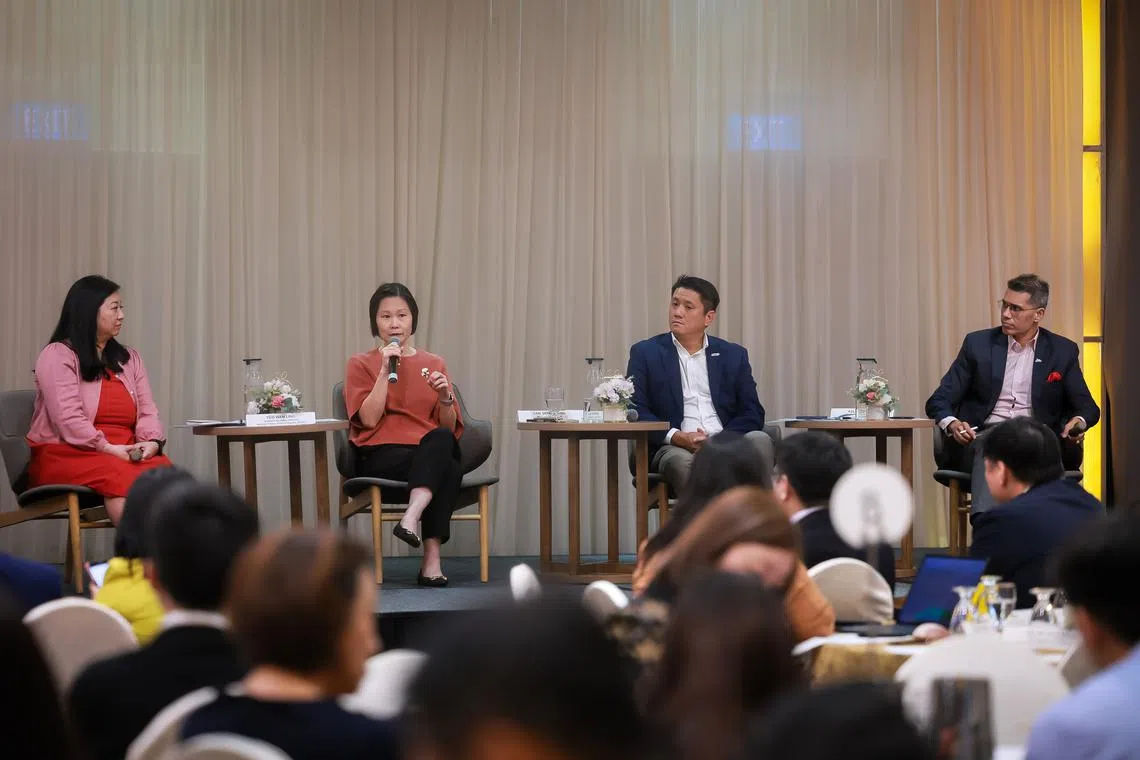Supportive work environment needed as more S’poreans take on caregiving: Gan Siow Huang
Sign up now: Get ST's newsletters delivered to your inbox

(From left) NTUC assistant secretary-general Yeo Wan Ling, Minister of State for Manpower Gan Siow Huang, SNEF honorary secretary Edwin Ng and IHRP CEO and moderator Aslam Sardar at the dialogue on Feb 20.
ST PHOTO: GAVIN FOO
SINGAPORE – As the population in Singapore continues to age and more people are likely to find themselves in caregiving roles, it has become increasingly important for flexible work arrangements to be an available option.
This was one of the observations made by Minister of State for Manpower Gan Siow Huang at a dialogue between representatives of the Government, unions and employers on Tripartite Guidelines on Flexible Work Arrangement Requests (TG-FWAR) held at Furama City Centre on Feb 20.
She said: “It is our duty to create an environment that is supportive, so that those people who want to work can continue to work.”
Ms Gan was one of three panellists at the dialogue. The three are also the co-chairs of a workgroup formed in 2023 to develop a set of guidelines
The workgroup comprises representatives from the Government, National Trades Union Congress and Singapore National Employers Federation (SNEF), as well as others from various union, employer, workplace fairness and professional bodies.
At the dialogue, fellow panellist Edwin Ng, honorary secretary of SNEF, said the upcoming TG-FWAR should not make offering such arrangements mandatory, but added that they should require employers to properly consider requests based on business needs.
The third panellist was Ms Yeo Wan Ling, NTUC assistant secretary-general, as well as director of U SME and U Women and Family. The panel was moderated by Mr Aslam Sardar, chief executive of the Institute for Human Resource Professionals.
The guidelines on FWAs, expected to be released later in 2024, could include examples of what are reasonable and unreasonable business grounds to justify why requested FWAs cannot be provided, said the Ministry of Manpower (MOM).
Mr Ng said: “We do not want to go towards legislation and become adversarial in the workplace. Having the guidelines allows for the process where employees could have an FWA request conversation. Employers can continue their existing informal process.”
He added that the move will help companies which are unsure of what to do and need a more formalised guide.
At the dialogue, MOM also provided some preliminary updates from its various stakeholder engagements.
The workgroup, which includes MOM, stressed that there is no “one-size-fits-all” approach to FWAs, but requests from employees should be properly considered, and those involved should bear in mind both the needs of the employees and the employers’ business considerations.
It also said that the guidelines should not replace informal discussions, but rather, focus on how formal requests should be made and properly handled to maintain workplace trust.
The guidelines could also assist employers to clearly communicate their approach to handling FWA requests.
Ms Gan said FWAs refer to more than just working from home, but should also include time-based flexibility.
She said such arrangements will allow workers to not just have good careers, but also fulfilling personal and family lives.



